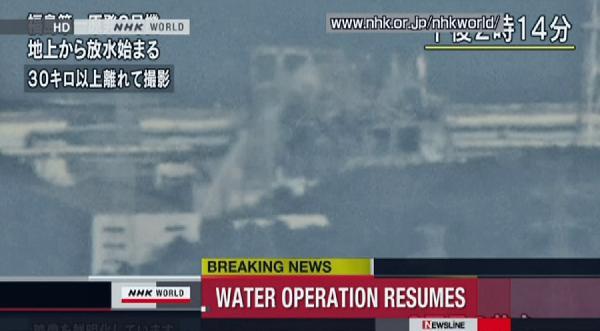 |
| Fire trucks spray water on nuclear reactor No.3 at Fukushima Daiichi nuclear power plant in this still image taken from video footage March 18, 2011. Japanese fire trucks began spraying water on the reactor in a bid to cool down the facility's overheating fuel rods. Japan has been battling for nearly a week to bring under control the overheating Fukushima nuclear plant after it was battered by a massive earthquake and tsunami. (Xinhua/Reuters Photo) |
TOKYO, March 18 (Xinhua) -- Seven Japanese Self-Defense Forces (SDF) fire trucks continued Friday to spray water over the No. 3 reactor of Fukushima No. 1 nuclear power plant in an effort to cool the overheating spent fuel rods storage pool.
Defense ministry officials said that the SDF trucks headed for the reactor in turn, dousing 50 tons of water at the reactor.
TV footage showed that plumes of white smoke were rising from the reactor following injection of water.
Radiation has seen a steady decline near the quake-damaged Fukushima No.1 nuclear power plant following water injection on Thursday, said the Nuclear and Industrial Safety Agency earlier Friday.
According to measurements taken by the agency around 1.1 km west of the plant's No.2 reactor, hourly radiation dose stood at 279.4 microsievert at 5 a.m. Friday, down from 309 and 292 microsievert around the time when the SDF began injecting water at the reactor to cool down the overheating spent fuel storage pool.
On Thursday morning two SDF CH-47 helicopters dumped water on the damaged No.3 reactor, followed by five fire and rescue trucks equipped with high-pressure water cannons shooting around 30 tons of water at the reactor later in the day.
Emergency workers are racing against time to restore electricity to No.1 and No.2 reactors Friday, and to No. 3 and No. 4 reactors Sunday, to restart pumps to pour coolant on the overheating fuel rods and avert a major radiation leak.
There have been a series of explosions at the Fukushima No. 1 power station since the magnitude 9.0 earthquake and ensuing tsunami hit northeastern Japan last Friday, damaging the back-up generators which led to failure of cooling systems at the plant.





